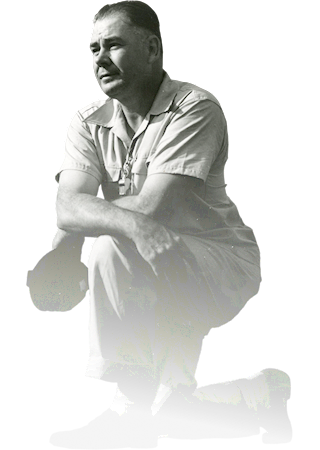Robert Neyland is considered by many to be one of the greatest college football coaches of all time, and best known as the head coach of the University of Tennessee football team, the Tennessee Volunteers, from 1926 to 1952. During his 21-year tenure as Tennessee’s head coach, he amassed

Robert Reese Neyland is a name that echoes with reverence across the landscape of college football. More than just a coach, he was a tactician, a visionary, and a symbol of discipline and excellence. Considered by many to be one of the greatest coaches in the history of the sport, Neyland’s legacy is most deeply rooted in his legendary tenure as head football coach at the University of Tennessee, where he led the Volunteers through an era of sustained dominance, transformation, and national relevance. His time on the sidelines, from 1926 to 1952, defined Tennessee football and helped shape the trajectory of college football in the South.
Born in Greenville, Texas, in 1892, Neyland was a standout student and athlete who embodied the qualities of a disciplined leader early in life. He attended the United States Military Academy at West Point, where he played football under another future Hall of Fame coach, John McEwan. As a lineman and later an assistant coach, Neyland absorbed the principles of precision and preparation that would become hallmarks of his own coaching philosophy. His military background would also prove central to his approach; he was not only a coach, but also a brigadier general in the United States Army Corps of Engineers—a title that would become a permanent part of his name in Tennessee lore.
Neyland’s arrival in Knoxville came in 1925 when he was appointed assistant professor of military science and tactics at the university. In 1926, he took over as head football coach, tasked initially with one simple mission: “even the score with Vanderbilt,” Tennessee’s biggest rival at the time. What followed was far more than a series of rivalry wins. Neyland built a juggernaut. Over 21 seasons at the helm, interrupted three times by military service, Neyland transformed Tennessee football into a national powerhouse.
During his 21-year coaching career, Neyland compiled an astonishing record of 173 wins, 31 losses, and 12 ties, good for an .829 winning percentage—still one of the best in college football history. Under his leadership, Tennessee captured four national championships (1938, 1940, 1950, and 1951) and seven Southeastern Conference (SEC) titles. Neyland’s teams were known for their suffocating defenses, machine-like execution, and an unwavering commitment to discipline and fundamentals. His coaching style was methodical, and he treated the game as a strategic chess match, often outmaneuvering more athletic or high-scoring opponents through sheer preparation and tactical superiority.
Perhaps Neyland’s most famous stretch came from 1938 to 1940, when his Tennessee teams went 33-0 in the regular season and posted one of the most incredible defensive feats in football history—shutting out 17 consecutive opponents. The 1939 team, in particular, is widely regarded as one of the greatest defensive units ever assembled, allowing zero points in the regular season. Even in an era where passing was limited and physicality reigned supreme, Neyland’s teams were unmatched in organization, toughness, and discipline.
The brilliance of Neyland’s coaching extended far beyond the field. He was a pioneer in breaking down the game into manageable components and establishing principles that are still studied today. His famous “Seven Game Maxims” became the bedrock of Tennessee football and are recited by players in the locker room before every game to this day. These maxims emphasized fundamentals, effort, composure, and the importance of capitalizing on opportunities—timeless values that define championship-caliber football.
Neyland’s impact on Tennessee went far beyond his win-loss record. He was instrumental in the development of the university’s athletic infrastructure, most notably the expansion of Shields-Watkins Field into what would eventually become Neyland Stadium. At his urging, the stadium grew from a modest 3,200-seat venue to one of the largest and most iconic college football cathedrals in the country. Today, Neyland Stadium seats over 100,000 fans and stands as a monument to the man whose vision helped make Tennessee football synonymous with excellence and pageantry.
He was also deeply committed to the values of leadership, education, and service. As a military officer, Neyland served with distinction in both World War I and World War II. His absences from the Tennessee sideline were not due to scandal or failure, but because he was called to serve his country. His ability to transition seamlessly between the battlefield and the football field speaks volumes about his character and capacity for leadership. Few figures in American sports history have bridged the worlds of athletics and military service with such honor and success.
Neyland’s influence reached well beyond Knoxville and the SEC. He was a major figure in shaping the evolution of college football in the South, at a time when the region was struggling for national respect in the sport. His success helped prove that Southern teams could compete with, and often beat, the traditional powers of the Midwest and Northeast. As a result, he helped shift the balance of power in college football, paving the way for the rise of the SEC as a dominant force in the sport—a legacy that endures today.
Under Neyland’s leadership, Tennessee became a model program—respected for its discipline, admired for its consistency, and feared for its results. Countless players under his tutelage went on to successful careers both in football and beyond, molded by the discipline and life lessons they learned under the General’s watchful eye. He was known for his meticulous preparation, quiet intensity, and deep respect for the game. Though often stoic, Neyland inspired fierce loyalty from his players and staff, many of whom went on to coach themselves, spreading his philosophies across the football landscape.
Robert Neyland’s legacy has also stood the test of time through continued reverence in Tennessee’s program identity. Every Tennessee coach since Neyland has operated in the shadow of his achievements, his name literally looming above the field they coach on. His maxims remain a living, breathing part of Tennessee’s football DNA. His standard for excellence is not merely referenced; it is pursued. While the sport has evolved, the principles Neyland championed—discipline, preparation, toughness, and precision—remain the core of championship football.
Even decades after his passing in 1962, Neyland’s influence can be felt on every game day in Knoxville. The stadium that bears his name is more than a playing field—it is a shrine to his philosophy and his profound impact on a university, a state, and a sport. Visitors to Neyland Stadium pass a statue of the General at Gate 21, a solemn bronze sentinel that represents not just a coach, but a man whose life was dedicated to service, competition, and excellence.
For all his achievements, Neyland never sought personal fame. He let his teams, his record, and his legacy speak for themselves. He avoided flamboyance, rejected shortcuts, and adhered unwaveringly to a code of honor that resonated far beyond the field. In an age of bombast and self-promotion, his humility stands out as a powerful example of leadership through substance, not spectacle.
In 1956, four years after retiring from coaching, Neyland was inducted into the College Football Hall of Fame—a fitting tribute to a man whose impact went beyond wins and championships. But for Tennessee fans, no hall or plaque could ever fully capture what Neyland meant to their program and their identity. He didn’t just build a football team; he built a culture, a legacy, and a standard that still defines Tennessee football nearly a century later.
It is difficult to quantify the total impact of Robert Neyland on the game of football. His name belongs in any discussion of the greatest coaches to ever walk a sideline, alongside figures like Knute Rockne, Bear Bryant, Woody Hayes, and Tom Osborne. But what sets Neyland apart is the multifaceted nature of his contributions. He was not just a winning coach; he was a military officer, a campus leader, an innovator, and a builder of men. His fingerprints can be found in every corner of Tennessee’s program—from its stadium and traditions to its values and expectations.
Perhaps the greatest testament to Neyland’s legacy is not the banners hanging in the stadium or the records etched in media guides. It is the enduring respect with which he is remembered by generations who never saw him coach but who still feel his presence. Each time the Volunteers take the field, each time fans chant “Rocky Top” in unison, each time a Tennessee player recites the Seven Maxims before battle, they are carrying on the legacy of a man who saw football not as a game, but as a discipline worthy of devotion.
Robert Neyland’s story is not just about Tennessee football—it is about the timeless ideals of leadership, commitment, and excellence. He was a product of his time, a man shaped by war and duty, but his lessons are eternal. In the ever-changing world of college football, where trends rise and fall, and coaching tenures grow shorter, Neyland’s model remains one to be studied and emulated.
Robert Neyland was more than a coach. He was a builder of a football empire, an architect of discipline, and a guardian of a tradition that continues to thrive long after his final whistle. For Tennessee, and for the broader world of college football, his legacy remains a foundation—unshakable, unbreakable, and eternal.









